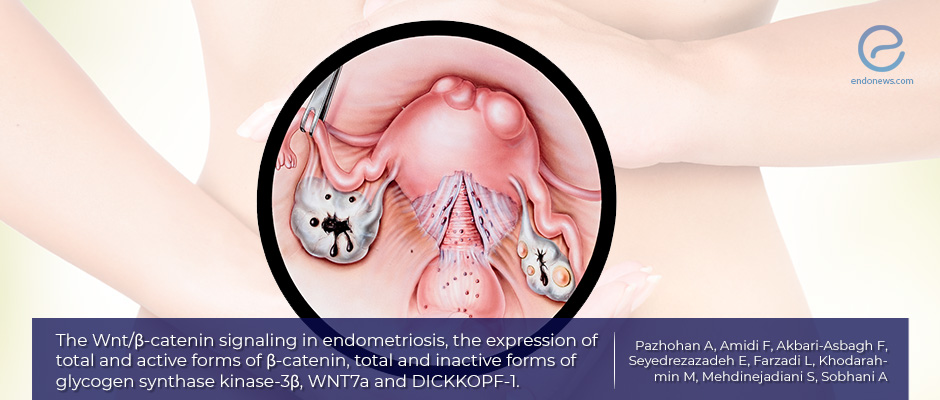The Wnt/b-catenin signaling in endometriosis
Jun 6, 2019
The importance of several main components of Wnt/b-catenin signaling in endometriosis
Key Points
Highlight:
- Dr. Sobhani group investigated the expression of total and active (or inactive) forms in several main components of Wnt/b-catenin signaling in both endometriosis patients and healthy women.
Importance:
- The normal endometrium undergoes cyclical remodeling under control of estrogen and progesterone secreted by ovaries. It has been accepted that estrogen and progesterone were regulated by Wnt/b-catenin signaling.
- Recently, inhibition of Wnt/b-catenin signaling showed the reduction of endometrial cell migration, proliferation, and invasion.
- However, most of the previous studies focused on the evaluation of the localization of factors such as b-catenin and GSK-3b within the endometrial cells.
- Here, Dr. Sobhani group from Tehran University in Iran investigated the expression of total and active (or inactive) forms in several main components of Wnt/b-catenin signaling such as b-catenin, GSK-3b, WNT7a, and DKK-1.
- Furthermore, they measured those expressions in endometriotic lesions and eutopic endometrium of a homogeneous group of infertile endometriosis patients during the window of implantation.
What’s Done Here:
- Total 48 women were participated in this study (control=14, endometriosis=34).
- The protein and mRNA expression of DKK-1 were significantly down-regulated in the endometriosis group (endometriotic lesions and eutopic endometrium).
- The expression of non-phosphorylated b-catenin (active) and phosphorylated GSK-3b (inactive) were up-regulated in endometriosis patients.
- The protein and mRNA levels of b-catenin, GSK-3b, and WNT7a were not significantly different between endometriosis and control group.
Conclusions:
- There are two essential elements for aberrant activation of Wnt/b-catenin signaling in the secretory phase of the menstrual cycle in endometriosis; excessive inactivation of GSK-3b and suppression of the expression of Wnt signaling inhibitor DKK-1.
- Interventions in this signaling pathway may allow for the exploration of potential new targets for the control of development and progression of endometriosis.
Lay Summary
Endometriosis is a very common gynecological disorder, which affects approximately 10% of reproductive-aged women, and is one of the most common reasons for infertility. The normal endometrium undergoes cyclical remodeling under control of sex hormones secreted by ovaries- estrogen and progesterone. It has been accepted that estrogen and progesterone were regulated by Wnt/b-catenin signaling.
In a recent study, inhibition of Wnt/b-catenin signaling repressed the main characteristics of endometrial cells involved in the development of endometriosis including cell migration, proliferation, and invasion. However, most of the previous studies focused on the evaluation of the localization of factors such as b-catenin and GSK-3b within the endometrial cells.
Here, Dr. Sobhani group from Tehran University in Iran investigated the expression of total and active (or inactive) forms in several main components of Wnt/b-catenin signaling such as b-catenin, GSK-3b, WNT7a, and DKK-1. Furthermore, they assessed those expressions in endometriotic lesions and eutopic endometrium of a homogeneous group of infertile endometriosis patients during the window of implantation.
Total 48 women were participated in this study (control=14, endometriosis=34). The protein and mRNA expressions of DKK-1 were significantly down-regulated in both endometriotic lesions and eutopic endometrium of endometriosis group. They also demonstrated that the expression of non-phosphorylated b-catenin (active) and phosphorylated GSK-3b (inactive) were up-regulated in endometriosis patients. The protein and mRNA levels of b-catenin, GSK-3b, and WNT7a were not significantly different between endometriosis and control group.
Based on these results, Dr. Sobhani group concluded that there are two essential elements for aberrant activation of Wnt/b-catenin signaling in the secretory phase of the menstrual cycle in endometriosis. These are excessive inactivation of GSK-3b and suppression of the expression of Wnt signaling inhibitor DKK-1.
Interventions in this signaling pathway may allow for the exploration of potential new targets for the control of development and progression of endometriosis.
Research Source: https://www.ncbi.nlm.nih.gov/pubmed/29107840
Endometriosis DKK-1 WNT7a GSK-3b b-catenin

